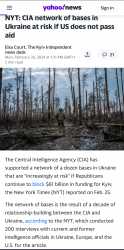[6 / 1 / 5]
Quoted By: >>1271442
https://news.yahoo.com/nyt-cia-network-bases-ukraine-123116608.html
The Central Intelligence Agency (CIA) has supported a network of a dozen bases in Ukraine that are "increasingly at risk" if Republicans continue to block $61 billion in funding for Kyiv, the New York Times (NYT) reported on Feb. 25.
The network of bases is the result of a decade of relationship-building between the CIA and Ukraine, according to the NYT, which conducted 200 interviews with current and former intelligence officials in Ukraine, Europe, and the U.S. for the article.
The bases allow the Ukrainian military "to track Russian spy satellites and eavesdrop on conversations between Russian commanders," the NYT said.
"These intelligence networks are more important than ever," now that Russia is intensifying its offensive and Ukraine "more dependent on sabotage and long-range missile strikes that require spies far behind enemy lines."
CIA Director William Burns secretly visited Ukraine on Feb. 22 "to try to reassure Ukrainian leaders," the NYT said, in what was his 10th visit to the country since Russia launched its full-scale invasion.
The relationship between Ukrainian and U.S. intelligence began to deepen in 2015, when then-President Petro Poroshenko appointed Valeriy Kondratiuk to head Ukraine's military intelligence agency.
After the EuroMaidan Revolution in 2014, the U.S. initially distrusted Ukrainian officials and worried about "provoking the Kremlin," the NYT said.
Kondratiuk built relations with the CIA, which in 2016 agreed to help modernize Ukraine's military intelligence agency in exchange for intelligence from Ukraine, the NYT said. A red line was that the CIA would not help Ukrainian intelligence conduct lethal operations.
According to the NYT, Ukraine gradually became "an intelligence-gathering hub that intercepted more Russian communications than the CIA station in Kyiv could initially handle."
The Central Intelligence Agency (CIA) has supported a network of a dozen bases in Ukraine that are "increasingly at risk" if Republicans continue to block $61 billion in funding for Kyiv, the New York Times (NYT) reported on Feb. 25.
The network of bases is the result of a decade of relationship-building between the CIA and Ukraine, according to the NYT, which conducted 200 interviews with current and former intelligence officials in Ukraine, Europe, and the U.S. for the article.
The bases allow the Ukrainian military "to track Russian spy satellites and eavesdrop on conversations between Russian commanders," the NYT said.
"These intelligence networks are more important than ever," now that Russia is intensifying its offensive and Ukraine "more dependent on sabotage and long-range missile strikes that require spies far behind enemy lines."
CIA Director William Burns secretly visited Ukraine on Feb. 22 "to try to reassure Ukrainian leaders," the NYT said, in what was his 10th visit to the country since Russia launched its full-scale invasion.
The relationship between Ukrainian and U.S. intelligence began to deepen in 2015, when then-President Petro Poroshenko appointed Valeriy Kondratiuk to head Ukraine's military intelligence agency.
After the EuroMaidan Revolution in 2014, the U.S. initially distrusted Ukrainian officials and worried about "provoking the Kremlin," the NYT said.
Kondratiuk built relations with the CIA, which in 2016 agreed to help modernize Ukraine's military intelligence agency in exchange for intelligence from Ukraine, the NYT said. A red line was that the CIA would not help Ukrainian intelligence conduct lethal operations.
According to the NYT, Ukraine gradually became "an intelligence-gathering hub that intercepted more Russian communications than the CIA station in Kyiv could initially handle."

